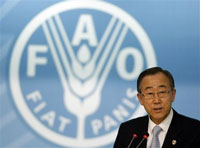Food production expected to rise by 50 percent by 2030, UN chief says
World food production must rise by 50 percent by 2030 to meet increasing demand, U.N. chief Ban Ki-moon told world leaders Tuesday at a summit grappling with hunger and civil unrest caused by food price hikes.

The secretary-general told the Rome summit that nations must minimize export restrictions and import tariffs during the food price crisis and quickly resolve world trade talks.
"The world needs to produce more food," Ban said. "Food production needs to rise by 50 percent by the year 2030 to meet rising demand."
The Rome-based U.N. Food and Agriculture Organization is hosting the three-day summit to try to solve the short-term emergency of increased hunger caused by soaring prices and to help poor countries grow enough food to feed their own.
In a message read to delegates, Pope Benedict XVI said "hunger and malnutrition are unacceptable in a world which, in reality, has sufficient production levels, the resources, and the know-how to put an end to these tragedies and their consequences."
He told the world leaders that millions of people in unstable countries were looking to them for solutions.
Ban said a U.N. task force he set up to deal with the crisis is recommending the nations "improve vulnerable people's access to food and take immediate steps to increase food availability in their communities."
That means increasing food aid, supplying small farmers with seed and fertilizer in time for this year's planting seasons, and reducing trade restrictions to help the free flow of agricultural goods.
"Some countries have taken action by limiting exports or by imposing price controls," Ban said. "They only distort markets and force prices even higher."
The World Bank calculates that there has been an 83 percent increase in prices in the last three years.
Price speculation, the increasing diversion of food and animal feed to produce biofuel, and sharply higher fuel costs have conspired to help to shoot prices upward, experts say.
U.N. officials said on Monday that they also intend to request the United States and other nations phase out subsidies for food-based biofuels, including ethanol. But in his speech Tuesday, Ban only called for "a greater degree of international consensus on biofuels."
That, however, could be difficult: Participants on the eve of the conference did not even agree on how much a role biofuels play in driving up prices.
The United Nations is encouraging summit participants to start undoing a decades-long legacy of agricultural and trade policies that many blame for the failure of small farmers in poor countries to feed their own people
"We're calling for a renaissance," said Jim Butler, FAO's deputy director general. He told leaders that "it is time to reinvest, reevaluate agricultural" policies.
That's an ambitious goal, considering a previous pledged aim of halving world hunger by 2015 has proven elusive. FAO director-general Jacques Diouf told the delegates that at the current rate the target "would not be reached in 2015 but in 2150."
Critics contend that subsidies for farmers in wealthy nations are hurting farmers in poor countries by stifling competition. Butler, however, said in an interview ahead of the gathering that a draft document that could be the basis for a final summit declaration doesn't promise to overhaul subsidy policy.
The U.S. Congress last month passed a five-year farm bill heavy on subsidies, bucking White House objections that such aid in the middle of a global food crisis wasn't warranted.
Heading the U.S. delegation to the summit, Agriculture Secretary Ed Schafer insisted on Monday that biofuels contribute only 2 or 3 percent to a predicted 43 percent rise in prices this year.
Figures by other international organizations, including the International Monetary Fund, show that increased demand for biofuels is contributing by 15-30 percent to food price increases, said Frederic Mousseau, a policy adviser at Oxfam, a British aid group.
"Food stocks are at their lowest in 25 years, so the market is very vulnerable to any policy changes" such as U.S. or European Union subsidizing biofuels or mandating greater use of this energy source, Mousseau said.
Brazil is another large exporter of biofuels, and its president, Luiz Ignacio Lula da Silva was expected to defend biofuels at the summit.
Washington's ambassador to the Rome-based U.N. food agencies, Gaddi H. Vasquez, predicted in an interview that the summit would be a "critical first step in a global conversation on issues related to food security that will continue beyond the summit," including at this summer's G-8 in Japan.
But on Monday, several participants indicated they wouldn't even be talking to each other.
Australia's foreign minister decried as "obscene" Zimbabwean President Robert Mugabe's participation in the summit. The longtime African leader has presided over the collapse of his former breadbasket nation into an agricultural basket case.
The Dutch ministry for overseas development pledged to "ignore" Mugabe during the summit.
Schafer, asked about the presence of the Zimbabwean and Iranian leaders, told reporters in Rome that the two were welcome to attend the summit, but that U.S. delegates would not be meeting with them.
Jewish leaders and some Italian politicians were among those denouncing Iranian President Mahmoud Ahmadinejad's attendance at the meeting. On Monday, Ahmadinejad said Israel, which is also taking part in the summit, "has reached the end of its function and will soon disappear off the geographical domain."
Ahmadinejad was scheduled to speak to the summit in early afternoon and give a news conference a few hours later.
EU sanctions against Mugabe because of Zimbabwe's poor human rights record forbid him from setting foot in the bloc's 27 nations, but those restrictions don't apply to U.N. forums.
Italian news reports said that neither Mugabe nor Ahmadinejad were among leaders invited to a working dinner Tuesday night in the hilltop Renaissance Villa Madama, an Italian government showcase.
AP photo
Subscribe to Pravda.Ru Telegram channel, Facebook, RSS!


